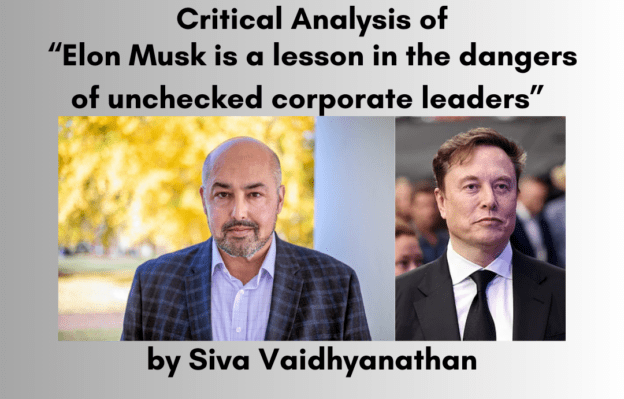The latest article by Siva Vaidhyanathan, “Elon Musk is a lesson in the dangers of unchecked corporate leaders”, recently published in The Guardian, seems to show similar flaws to his previous article, already two months old, about the imminent collapse of X/Twitter and the danger of Elon Musk. He uses his previous article as “evidence” in his latest piece, despite flaws in both. Join me in an exploration and critical analysis of this new article.
Introduction
In the modern era, the influence of corporate magnates on global politics and economics is undeniable. The intertwining of corporate interest and global diplomacy has its proponents and critics. In his recent article, Siva Vaidhyanathan offers a critique of one such figure, Elon Musk. While Vaidhyanathan is an established academic with a background in media studies, it’s worth noting that he has a track record (“has form”) of being critical towards Musk. See my previous “Critical analysis of “Twitter was locked in a chaotic doom loop. Now it’s on the verge of collapse” by Siva Vaidhyanathan” for more information. This history raises questions about objectivity and potential bias. Here, we will dive into a critical analysis of Vaidhyanathan’s arguments, examining their merits, weaknesses, and underlying evidence.
Contents
Précis of the Original Article
Vaidhyanathan’s article positions Elon Musk as a potentially dangerous figure due to his significant influence on global affairs. Drawing parallels with historical magnates like JP Morgan Jr, the piece delves into the risks of unchecked corporate power. Vaidhyanathan alleges that Musk’s motivations are primarily ego-driven and criticizes his ties to powerful figures like Vladimir Putin. Additionally, the article touches upon Musk’s financial debts to the Saudi investment fund, suggesting a potentially compromising position for Musk in global diplomacy. Vaidhyanathan contends that the unchecked power and influence of figures like Musk can be detrimental to global democracy and calls for more accountable models of power.
Critical Analysis
Assumptions Presented as Fact
The author occasionally presents personal opinions as fact without providing adequate evidence. This diminishes the credibility of the article. For example, the statement “Elon Musk is not the most reckless, destructive or dangerous corporate leader in world history. But he just might be the most reckless, destructive and dangerous corporate leader at this moment” is an assertion that lacks objective evidence.
Overgeneralizations and Comparisons
Vaidhyanathan makes a sweeping comparison of Elon Musk to historical figures such as JP Morgan Jr and the leaders of the British East India Company. While it is valid to discuss the influence of corporate leaders throughout history, equating Musk’s actions with those that have resulted in genocides or imperial colonization can be seen as an exaggeration.
Appeal to Authority
Mentioning articles from reputed publications like the New York Times and the New Yorker as well as Walter Isaacson’s biography creates an appeal to authority. However, the article doesn’t delve deep into what these sources say, and hence this reference feels superficial.
Conflating Different Issues
There seems to be an inconsistent conflation between Musk’s financial ties and his supposed ego-driven decisions. While Musk’s financial debts to Saudi investment funds might be a legitimate point of contention, tying that directly to his motivations without concrete proof is speculative.
Lack of Objective Evidence
The claim that Musk was “easily swayed by the seductively powerful such as Vladimir Putin” lacks citations or direct evidence linking Musk’s decisions to Putin’s influence.
Overreliance on the “Ego Argument”
The author frequently returns to the idea that Musk is driven purely by ego gratification, comparing him to a recent U.S. president in this regard. While ego might play a role in Musk’s decisions (as it might for many high-profile leaders), leaning heavily on this as the main driving factor simplifies a potentially complex situation.
Mischaracterization
The portrayal of Musk’s support in Ukraine seems contradictory. On one hand, he’s credited with ensuring StarLink satellites supplied essential connectivity during an infrastructure breakdown, but then he’s accused of stifling Ukraine’s defence. This makes the narrative convoluted.
Generalizing the Rich
The statement “When rich people convince themselves that they are rich because they’re smart – instead of lucky and ruthless – they tend to misapply their talents” is a sweeping generalization that portrays all wealthy individuals in a certain light, which is an oversimplification and could be deemed as bias.
Ambiguous Conclusions
The article concludes with a call for more accountable power in democratic nations, but it doesn’t provide clear steps or models on how this can be achieved.
Author’s Previous Stances
The claim that the author ascertains truths to be self-evident based on their own writings against Musk requires evidence. Without it, this criticism can’t be fully addressed. However, if this is the case, then it raises concerns about objectivity and bias in the piece.
Conclusion
In conclusion, while Vaidhyanathan raises valid concerns about the unchecked power of corporate leaders in global affairs, the article’s strength is diminished by its reliance on unverified assertions, overgeneralizations, and a possible lack of objectivity. A more balanced portrayal with objective evidence could make the arguments more persuasive.
Vaidhyanathan’s article offers a perspective that underscores the potential risks of unchecked corporate influence in global affairs. The historical context provided in the article offers a lens through which we can view Musk’s contemporary actions. However, several points in the article rest on assumptions rather than concrete evidence. Furthermore, Vaidhyanathan’s previous critiques of Musk, coupled with his tendency to use his own, potentially spurious work as evidence, could suggest a bias in his perspective. While the essence of the article – the need for accountability and checks on power – is valuable, its presentation would have benefited from a more balanced and evidence-based approach. It’s essential to approach such critiques with a discerning eye, weighing the legitimate concerns against potential underlying biases.
